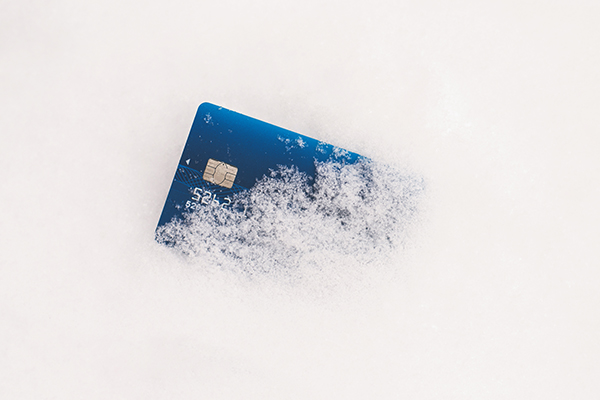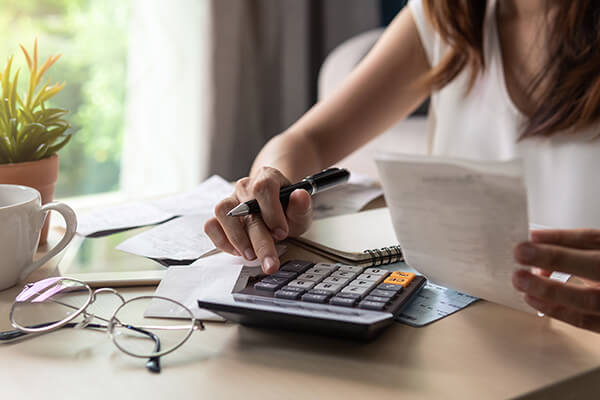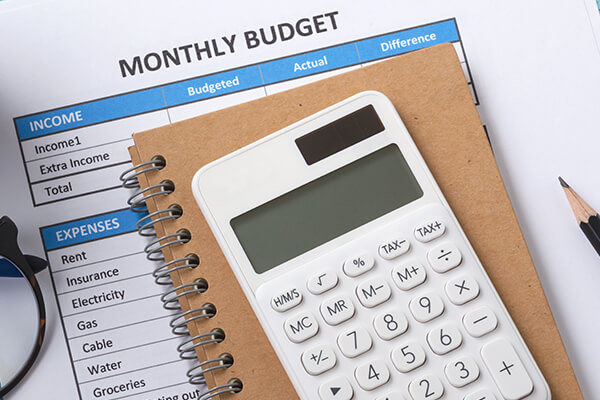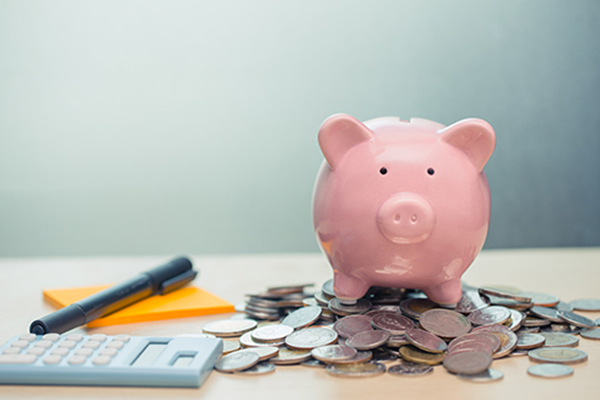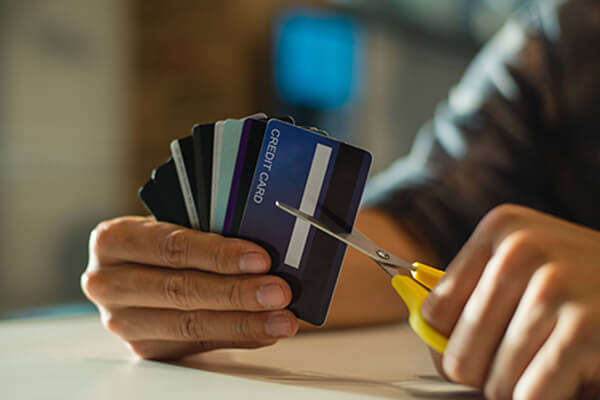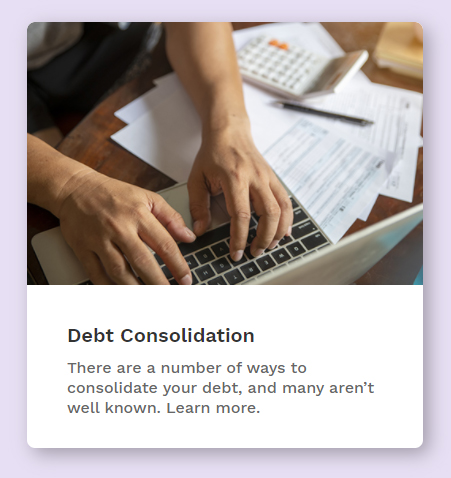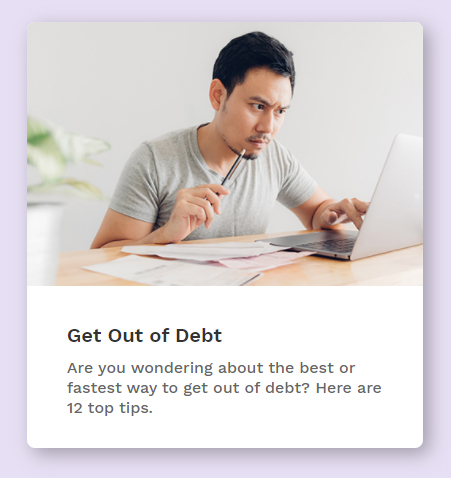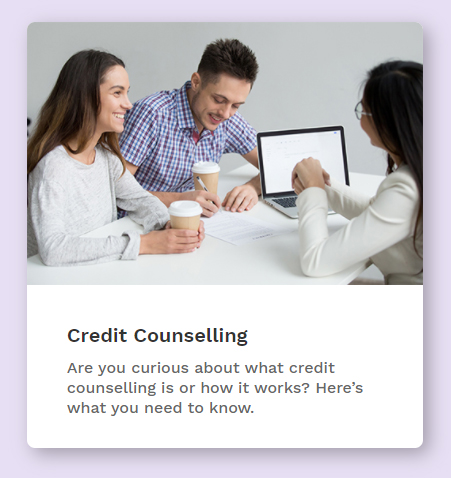How to Pay Off Credit Card Debt
Ideas to help you pay down your credit cards as quickly as possible.
10 Tips for Paying Off Credit Card Debt
Ready to learn the best ways to pay off your credit card debt? It’s easy to feel stuck when you’re struggling to make minimum payments on high interest debt and frustrated with how far your financial goals seem to be. However, no matter how bad you think your situation is, there’s a way out that will work for you. Here are 10 practical ways you can quickly tackle your maxed out cards and take your first real steps towards getting out of debt.
1. Set a Goal
Start by Setting a Goal You Can Achieve
It’s important to set realistic goals for yourself, especially when they’re about paying off high interest credit cards or other types of consumer debt (overdrafts, lines of credit, vehicle loans, etc.). Even if that goal is just planning to pay the minimum payment for the near future, that is better than nothing.
While it’s easy to quickly run up balances, it takes time and self-discipline to pay them off and find a strategy for credit card debt paying that works for you. Watch how you’re doing regularly to stay on track and motivated. Make your financial goals S.M.A.R.T. (Specific, Measurable, Attainable, Relevant, and Timely) to keep sight of what you’re aiming for. You can learn more about how to set S.M.A.R.T. financial goals here.
Knowing where you want to end up will make it much easier to figure out what you can do to get there. If you ever feel stuck, one of our certified counsellors would be happy to help.
2. Put Your Credit Cards on Ice
Yes, We Mean That Literally
This might be hard to hear, but getting out of debt means taking your credit cards out of your wallet so you’re not tempted to use them.
Freeze all of your credit cards in a bucket of ice until you’ve completely paid off your outstanding balances (yes, we mean that literally). Paying for your purchases with cash instead of credit will help you separate your needs from wants, remain conscious about your spending, and make you think twice before spending money.
Once your debt is gone, trying thawing out just one or two of your cards. You may find that one or two is more than enough for all of your needs.
3. Prioritize Your Debts
Credit Cards, Loans, Mortgages, etc.
Make a complete list of all your debts (outstanding balances, credit card accounts, interest rates, and charges) and list them in order of importance as the first step in your debt repayment strategy. Mortgage and vehicle payments are at the top of most lists because they provide your shelter and transportation for getting to and from your job.
What’s more or less important will be different for everyone. Many people want to get rid of their highest interest rate debts first, and others have specific debts like a payday personal loans that they want to cross out as soon as possible. Figure out what’s more important to you to decide the order for paying off your debts. The goal is to have a payment strategy that fits your financial needs while also keeping you motivated to pay off your debts one by one.
4. Trim Your Expenses
Free Up Some Cash to Pay Debt Faster
Speed up your debt repayment and get out of debt fast by reviewing your monthly expenses and looking for ways to cut your costs.
Start by tracking your spending for the next two weeks to find out where exactly your money is going (one month is even better). You might be surprised to learn that making your morning coffee instead of buying a $3 specialty drink will save you over $1,000 a year!
Check your spending to see if you can find more ways to save some money. Every little bit will help you get closer to a life free from credit card debt.
If you’d like more ways to save on expenses, we have tons of ideas on our educational website, MyMoneyCoach.ca. Here are some great resources:
5. Create a Monthly Spending Plan
It Will Help You Avoid More Debt
To learn how to get out of debt and to stop borrowing from your credit cards again and again, create a monthly spending plan for your money. This will let you live within your means rather than above your income, which is where credit card debt comes from. It will also make it clear when you can expect to be debt-free – so long as you stick to the plan.
Want help making a plan? We’ve got an interactive budget calculator spreadsheet that will guide you through the process and make the idea of budgeting way less painful. This will help you stay within your budget and maximize your ability to pay down your debts. We also have lots of other budgeting resources if you prefer different ways of budgeting.
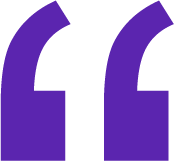
I highly recommend the Credit Counselling Society!
I was hesitant to make this call as I already felt ashamed about my financial situation. I was pleasantly surprised by how understanding and helpful both staff members were that I spoke with. The counselor, CCS gave me great advice and a personalized program to move forward. I highly recommend them!
April
6. Use the Avalanche Method
The Most Popular Way to Get Out of Credit Card Debt – Some Claim It’s the Best
Many people have found that the Avalanche Method was the best way to approach credit card debt paying.
Here’s how it works. After paying debts that are on fixed monthly payments (mortgages, vehicle loans, and term loans), make the minimum payment on your credit cards with the lowest interest rates and maximize your payments on the credit cards with the highest interest rates. Once a debt is paid, use this extra money to pay down the credit card with next highest interest rate.
The Avalanche Method will save you money and help you pay down all of your debts faster.
7. Use the Snowball Method
A Highly Motivating and Popular Debt Reduction Strategy
The debt snowball method is another method a lot of people like to use to get out debt by paying off small credit card balances first. This can have a powerful psychological effect on many people because they can feel like they’re making progress sooner. This can be very encouraging and provides a lot of people with motivation to keep paying down their debt. Here’s how it works:
1. Use any extra money you can come up with to pay off your credit card with the smallest balance first (ignore the interest rates and just focus on the card with the smallest balance). Paying off this card will give you a quick win and a sense of satisfaction and accomplishment.
2. Don’t pocket the minimum monthly payment that you used to pay every month on your smallest credit card. Instead, start paying down your next smallest credit card balance with that money. You should of course throw all the extra money you can at this debt to get it paid off as quickly as possible, but the key is to free up money as you pay off your smallest credit card balances first. The monthly payments you free up will help you pay down the next smallest credit card even faster.
3. Repeat the process: focus on paying off your next smallest credit card balance using the money freed up from the smaller cards you paid off earlier. With the snowballing monthly payment this method creates, your debts will get paid down faster and faster as you go, and you’ll get more and more motivated as you pay off one card after another.
Not sure whether Avalanche or Snowball is right for you? Each has its own perks. While paying off the highest interest rates first is mathematically correct, the psychological benefit of watching your debts go away faster (even if they’re the smallest ones) can’t be ignored. Some people are motivated by numbers and some are motivated by feeling that they accomplished something and seeing that progress. You know yourself. Go with the method that you think will work best for the way you tick.
Once you’ve paid off a card, cut it up and cancel the account. Most people only need one or two credit cards.
8. Use Savings
This Will Help You Pay Down Debt Faster
Many people regularly contribute to a savings plan, which is great, but this money could help you pay down what you owe faster or even your entire balance.
Once you have an emergency fund and are saving for irregular expenses, consider stopping extra payments to savings accounts until you’ve paid off what you owe. This is especially helpful for those who aren’t saving for something specific like vehicle repairs.
The money you save by paying down your debts faster will be much higher than any interest you’ll earn in a savings account. Also consider using income tax refunds, job raises, or other cash boosts to accelerate this process.
9. A Debt Consolidation Loan
A Balance Transfer Could Also be a Good Option
When used correctly*, debt consolidation loans, balance transfer credit cards and balance transfers are excellent ways to get out of debt.
Consider consolidating your debts with a consolidation loan or transferring your credit card balances to a low rate balance transfer credit card. However, make sure you understand the terms, conditions, any hidden balance transfer fee, and the overall interest savings you should get before signing anything.
Cut up and cancel your credit cards if you choose this option. If you don’t, you might be tempted to continue using them and further increase your debt load and make your debt even worse than before.
*Unfortunately, debt consolidation loans don’t help most people. When people get these loans but don’t change the habits that got them into debt in the first place, they just dig themselves deeper into debt. To get ahead using a debt consolidation loan, make sure you track your spending for at least 2 weeks. You also need to create a budget and follow it so that you’re not spending more than you earn. Don’t become someone who needs another debt consolidation loan to pay off your first one.
10. Refinance Your Mortgage
Consolidate Your Debt With Home Equity
If you own your home, you may have enough equity to consolidate all your debts into your mortgage. If you don’t have much equity in your home, additional mortgage insurance costs could be expensive. Consider your options and seek advice from someone other than your lender (since they have a vested interest in your choice).
Just like with a debt consolidation loan, when you consolidate debts into your mortgage, you also need to create a budget. If you don’t, you’ll always be tempted to borrow more when “emergencies” happen.
Repeatedly using your home as an ATM can set you up to face retirement with a lot of debt, no assets, and no savings.
If normal banks and credit unions aren’t able to help you with refinancing your mortgage, don’t immediately turn to a home equity lender. Instead, speak with one of our credit counsellors.
Credit counsellors will help you explore all your options and put together an effective plan to pay off all your credit card debt. There may even be options available to you that don’t involve using the equity in your home.
Find out how to get debt relief.
Get the help you need. Find the right option that will work for your specific set of circumstances - whether that means setting up an amortization schedule, negotiating an interest rate, discussing terms like principal balance and amortization, or just talking through different fees, we’re here to help. Instead of endlessly looking through debt consolidation company reviews, let one of our experienced counsellors help you. If we can't fully help you, we'll refer you to an organization we trust that can or help you put together an action plan so you can get started on your next steps. Feel free to give us a call or chat with us online. We're here to help.
Last Updated on March 18, 2024
Get the clarity you need
Personalized Tips for Paying Off Credit Card Debt
If you’re overwhelmed by your current financial circumstances or have difficulty maintaining a monthly budget, we can help you by providing personalized tips for paying off credit card debt. We’ll review your financial situation with you and explore all the different ways you can get rid of your debt. There are even debt relief and debt repayment programs that might help.
Get Some Help – It’s Free
Get a free appointment to explore your options and get back on track.
Related Topics
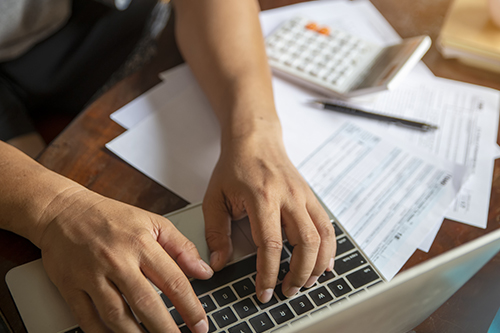
Debt Consolidation
There are a number of ways to consolidate your debt, and many aren’t well known. Learn more.

Get Out of Debt
Are you wondering about the best or fastest way to get out of debt? Here are 12 top tips.

Credit Counselling
Are you curious about what credit counselling is or how it works? Here’s what you need to know.
Was this page helpful?
Thanks for letting us know.

